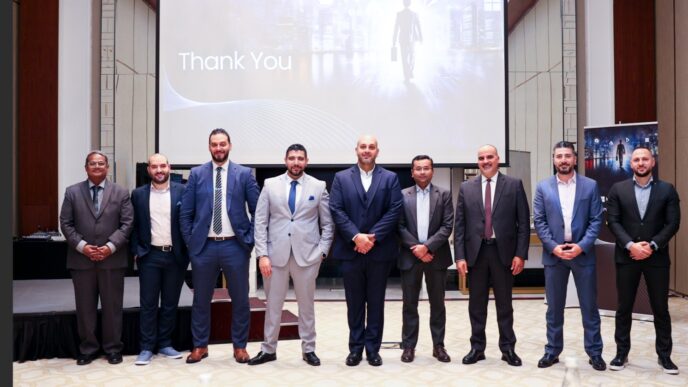
In this exclusive interaction, Muzammil Patel, CEO of Acies, shares insights on the company’s strategic growth plans, its approach to balancing innovation with execution, and the future of no-code technology in financial services. As Acies continues expanding its global footprint, he discusses how the company is leveraging its expertise in technology and advisory to drive transformation in financial institutions across the Middle East, Asia Pacific, and beyond.
Acies has been expanding its global footprint. What are your key strategic priorities for growth in the coming years?
Having initially established our base of operations in India both in terms of our offices and our client base, we have been working with financial services institutions and other enterprises as a technology solutions provider and as advisors in the Middle East and the Asia Pacific regions. We also have expanded our operations in these regions while also having operating entities based in the USA and Mauritius respectively.
Our key strategic priorities for the coming years are to further penetrate into the Middle East and Asia Pacific regions to work with the next wave of financial institutions and enterprises both as a technology provider and advisor while also further our customer base specifically for our technology products to the more advanced markets such as the European Region and the Americas.
In parallel, we are also looking to expand our current development center into other regions having a large technology talent base.
How does Acies balance innovation with the need for speedy implementation while maintaining high-quality outcomes?
As part our philosophy, we strive to combine domain expertise with technology advancements in our technology products – thereby ensuring outcomes that are not just high-quality but also compliant to the regulatory environment and more importantly, relevant and future proof to the business and market environment.
A key tenet to our philosophy is to have our professionals constantly upskilled in their domain as well as technology. With this philosophy, we have objectively observed that the speed to implementation vastly increases as our professionals clearly understand the business and regulatory realities so as to have our technology products already having features available to cater to the needs of our customer in a way that can be used on a near plug-and-play basis.
What are some of the key AI and automation trends that financial institutions should be prepared for?
In terms of automation trends, financial institutions have now begun to realize that the path of bespoke development can only be achieved with true tangible business and financial objectives through a no-code approach.
While artificial intelligence has greatly benefited financial institutions in terms of data ingestion to provide reasonable insights, the real value-add for financial institutions will be realized on a multi-agent or agentic framework where you have different agents operating on specific activities emerging from a single instruction.
The Revolutio, no-code platform. What inspired its creation, and how is it transforming financial services?
Like most technology companies, our journey in building software products began from addressing on-ground challenges and constraints of specific industries, which led to our software development lifecycle being constructed in the traditional way.
Through this journey, we had realized two challenges –
- Given the various technology products, we wanted to add in our software suites, we began to move to a direction of creating silos both in terms of the technology stacks and teams. As a result, this would have created a huge number of silos which makes it difficult to manage in the long run.
- We had professionals having significant domain expertise and general automation knowledge, but no coding experience. This led to a dependency of then hiring specific developers to cater to building applications. Combining this with the above would have led to us having to manage a web of various technology stacks and build large overheads of technical and non-technical workforce for each application.
Hence the idea of Revolutio got germinated with the mission of having a platform that empowers non-technical professionals to build their applications without any constraints as well as building multiple applications in a single codebase, which is managed at the platform level – thereby reducing any reliance of maintaining multiple pools of developers and overall reducing our total development costs which increasing the speed of building applications.
In a similar vein, financial institutions, either through specific departments or through their digital transformation teams end up with the same challenges. Instead of buying off-the-shelf applications and spending vast amounts of time and money to retrofit them into their technology stack and business operations or by hiring external developers to build bespoke applications which then leads them to numerous issues in application maintenance, financial institutions have begun to realize that a no-code approach is a better solution to build applications that cater to their business complexities without really “breaking the bank”.
No-code/low-code platforms are the next big innovation. Could you share your thoughts on this trend and its impact on regulatory compliance?
Well, no-code/ low-code platforms have been a huge innovation in the technology space but relatively muted in terms of fanfare when compared to innovations in the crypto, metaverse and artificial intelligence space. The trend for adoption has therefore been relatively slow compared to the above areas – but now moving steadily as tangible outcomes are being realized by enterprises that have adopted the no-code approach for their suite of applications.
In terms of its impact on regulatory compliance, there is no specific trend associated with it with the exception of no-code platforms maintaining standard information security protocols that are enjoyed by all applications getting build through it.
As a leader in both technology and advisory, how does Acies strike the right balance between human expertise and technological innovation?
At Acies, we believe that true positive and tangible outcomes can be realized by way of the right design, the right framework, the right implementation and the right amount of learning and development. While the first two is what our professionals in our consulting business focus on, it’s the implementation and learning and development that also requires the same human expertise while technological innovation is being handed to them through our no-code platform to emphasize on that human expertise.
With a strong focus on innovation, agility, and domain expertise, Acies is redefining the future of financial technology. By championing no-code solutions and fostering a seamless blend of human expertise and automation, the company is not only simplifying application development but also enabling enterprises to stay ahead in an evolving regulatory and business landscape. As Acies continues its expansion, its commitment to delivering high-quality, future-proof solutions remains at the core of its mission.
All Content Rights Reserved by The Catalyst.














